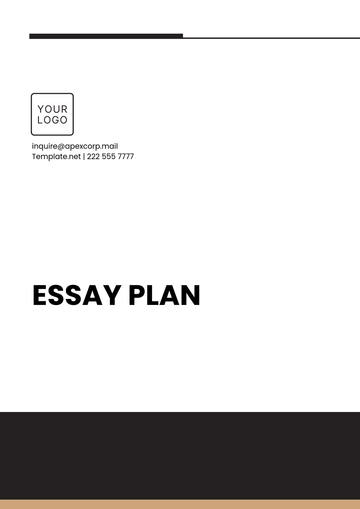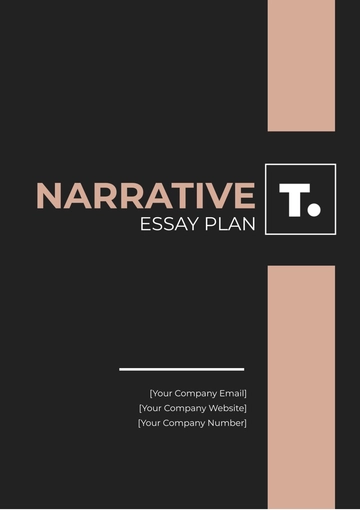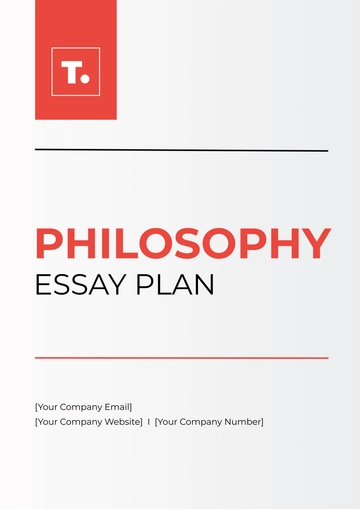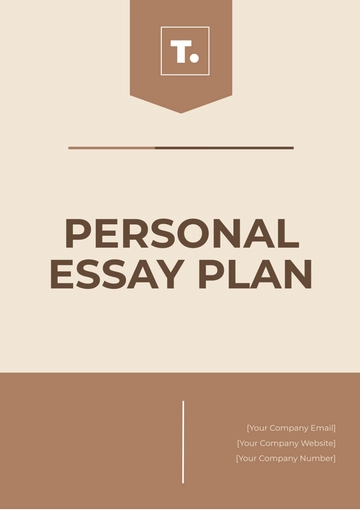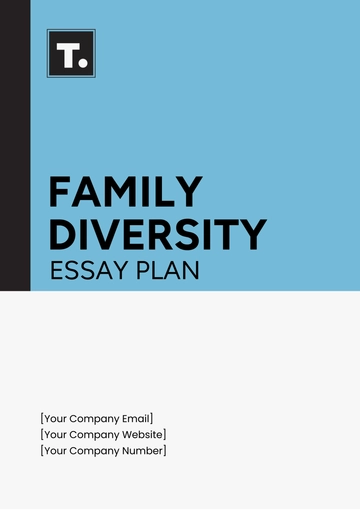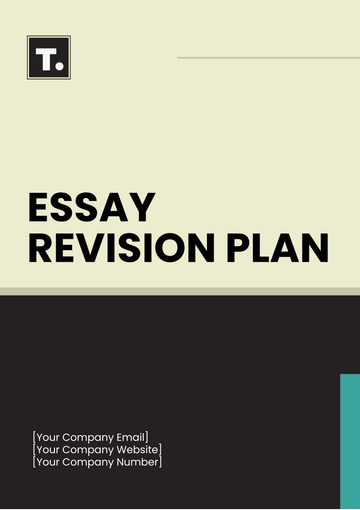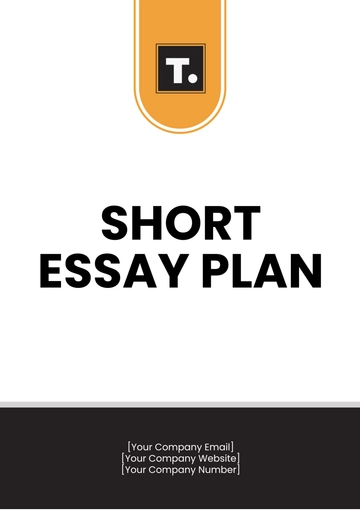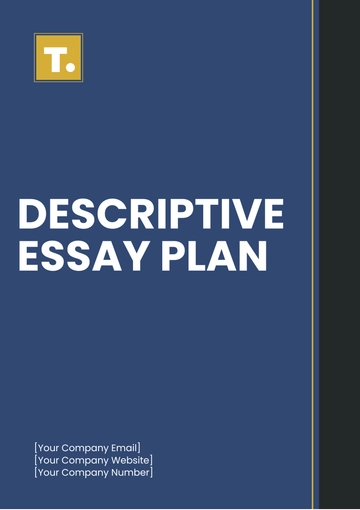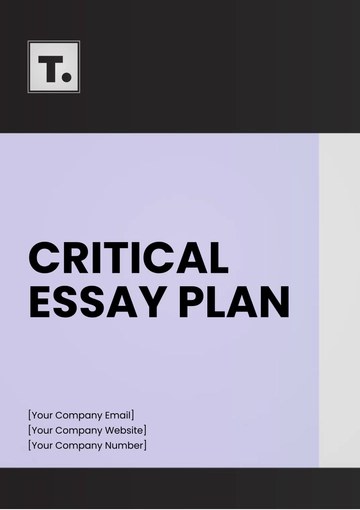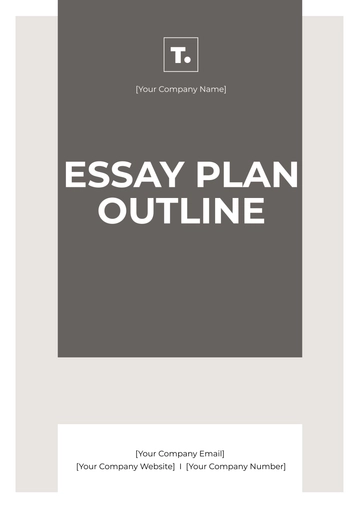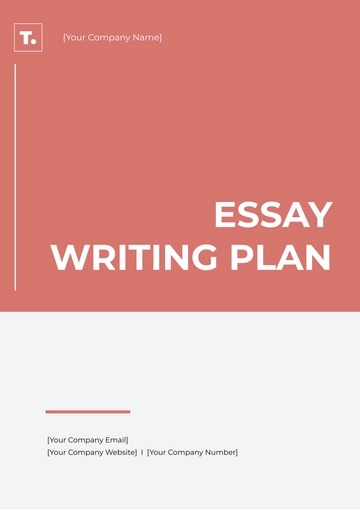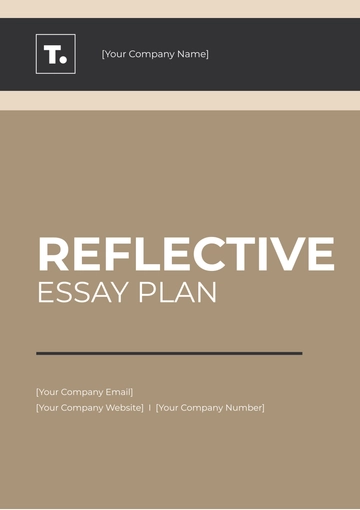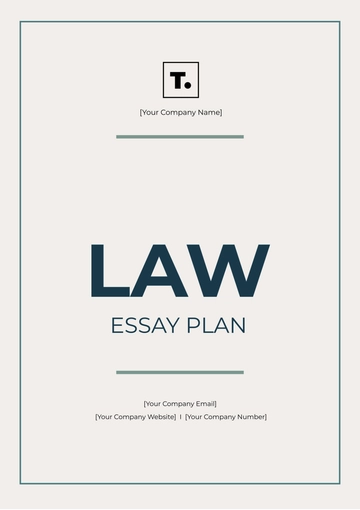Free Essay Plan
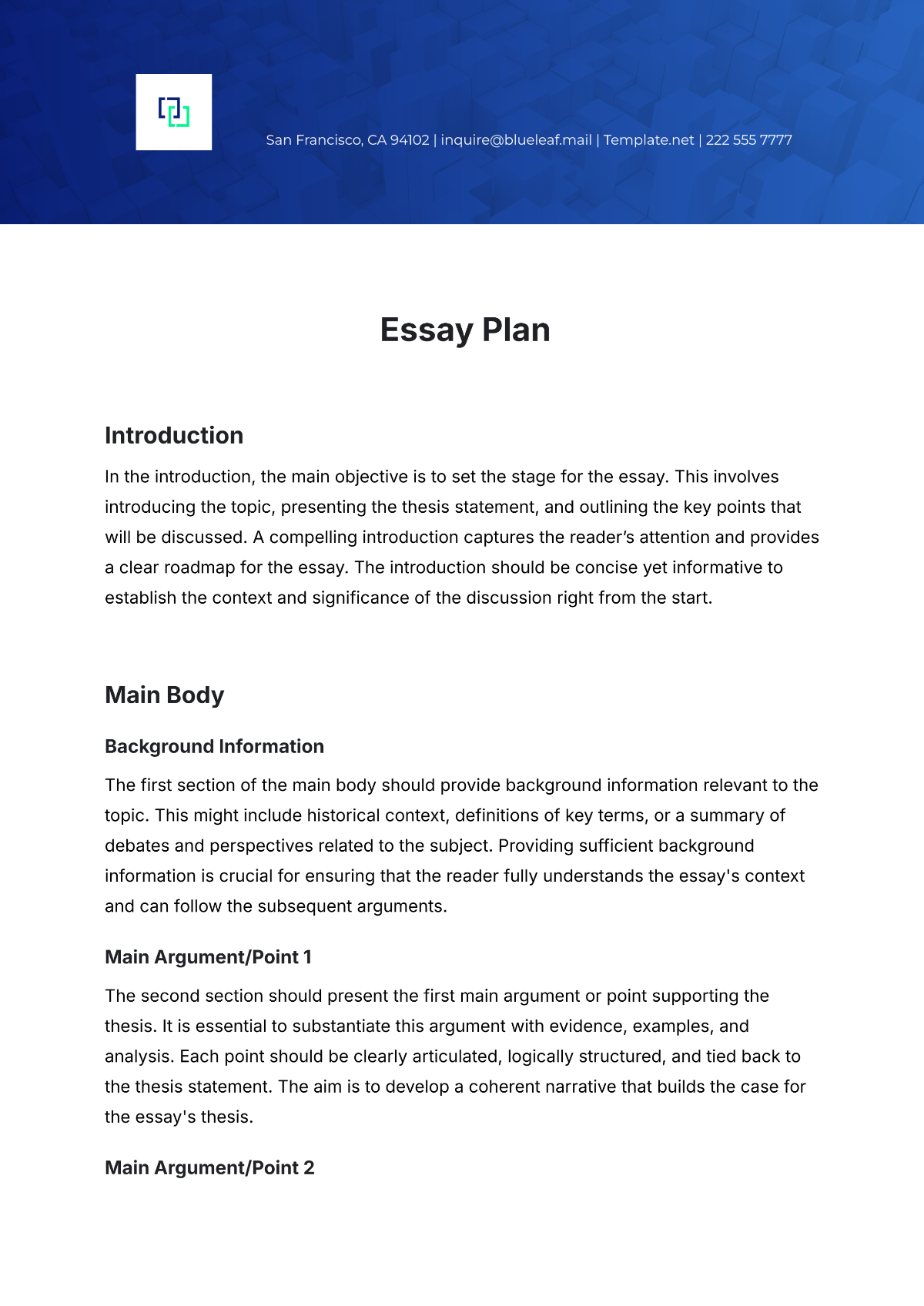
Prepared by: [YOUR NAME]
The Impact of Social Media on Mental Health: A Comprehensive Analysis
I. Introduction
Social media has become a central part of everyday life, significantly shaping how individuals interact with the world around them. As its usage has increased, concerns about its effects on mental health have also emerged. This essay explores the impact of social media on mental health, examining both the positive and negative aspects. Social media can provide connection and support, but it also introduces challenges such as increased anxiety, depression, and distorted self-image. It is important to understand how these platforms influence emotional well-being so that healthier online behaviors can be developed. In this essay, I will analyze the psychological impacts of social media, its role in shaping social behavior, and suggest potential solutions to mitigate its harmful effects.
II. Positive Effects of Social Media
Social media serves as a powerful tool for connection, especially for individuals who may feel isolated. Platforms such as Facebook, Instagram, and Twitter enable users to maintain relationships across distances and find emotional support from online communities. According to a study by Johnson and Miller (2059), social media has been shown to help combat loneliness by fostering connections between people who share similar experiences, such as those dealing with chronic illnesses or mental health issues. This ability to connect with others, particularly for marginalized groups, has helped individuals find a sense of belonging and understanding. While face-to-face interactions can be limited, social media offers a supportive space where people can express themselves and receive encouragement. Thus, it plays a crucial role in promoting emotional well-being for many individuals.
III. Negative Effects of Social Media on Mental Health
Despite the positive aspects, social media has also been linked to negative mental health outcomes. Research by Taylor (2059) indicates that increased use of social media platforms is associated with higher levels of anxiety and depression, particularly among teenagers and young adults. The constant comparison to others, the prevalence of cyberbullying, and the pressure to conform to unrealistic beauty standards have led many users to experience negative emotions. A recent survey found that 45% of teens reported feeling anxious due to the pressure of maintaining a certain image on social media (Taylor, 2059). These factors contribute to diminished self-esteem and heightened emotional distress, especially when users internalize the idealized images portrayed by influencers and celebrities. Social media’s ability to amplify feelings of inadequacy poses a serious concern for mental health, particularly among vulnerable groups.
IV. Social Media's Role in Shaping Social Behavior
Social media plays a significant role in shaping self-image and how individuals perceive themselves and others. Platforms like Instagram and TikTok have become major sources of influence, promoting curated content that often highlights unattainable beauty standards. According to Harris and Clark (2059), many young adults report feeling dissatisfied with their appearance after engaging with content on these platforms. The constant exposure to edited images and videos can distort users' perceptions of what is "normal," leading to negative body image and self-esteem issues. In a study by Harris and Clark (2059), it was found that 60% of young users reported feeling pressure to look a certain way after scrolling through these platforms. This reinforces a cycle of comparison and dissatisfaction that impacts individuals’ mental health and social interactions.
V. Solutions to Minimize Negative Impacts
To minimize the negative impacts of social media on mental health, several solutions can be implemented. One of the most effective approaches is promoting digital literacy and encouraging self-regulation among users. Educating individuals, particularly young people, about healthy social media habits can empower them to use these platforms mindfully. According to an article by Martin (2059), integrating social media literacy programs in schools and communities could help mitigate emotional harm by teaching users to critically assess online content and recognize its potential impact on their mental well-being. Additionally, individuals can benefit from self-awareness techniques such as setting time limits and curating their feeds to follow positive and supportive content. These strategies can encourage more balanced and healthier social media usage, fostering a more positive online experience.
VI. Conclusion
In conclusion, while social media provides many benefits, including the ability to connect with others and access support, it also has significant drawbacks when it comes to mental health. The negative effects of increased anxiety, depression, and distorted self-image are concerning, particularly for young adults and teenagers. However, by promoting digital literacy and encouraging mindful use, the harmful effects of social media can be minimized. It is essential for individuals, educators, and policymakers to collaborate in creating healthier online environments that prioritize mental well-being. As social media continues to evolve, understanding its impact on mental health will be critical in shaping a more balanced and supportive digital world for future generations.
Citations
Johnson, A., & Miller, S. (2059). The role of social media in combating loneliness. Journal of Psychological Studies, 12(3), 150-162.
Taylor, K. (2059). The rise of anxiety in the digital age: A survey on social media and mental health. Mental Health Review, 8(4), 23-35.
Harris, L., & Clark, T. (2059). The effects of social media on body image and self-esteem in young adults. Body Image Research, 11(2), 112-126.
Martin, R. (2059). Promoting social media literacy in schools: A solution for healthier digital engagement. Education for Wellness, 7(1), 45-58.
- 100% Customizable, free editor
- Access 1 Million+ Templates, photo’s & graphics
- Download or share as a template
- Click and replace photos, graphics, text, backgrounds
- Resize, crop, AI write & more
- Access advanced editor
Streamline your essay writing with Template.net’s Essay Plan Template! This fully editable and customizable tool helps you organize ideas effortlessly. Designed with flexibility in mind, it integrates seamlessly with Template.net’s AI Editable Tool, enabling quick adjustments to suit any topic or style. Perfect for students and professionals looking to create structured, impactful essays with ease.
You may also like
- Finance Plan
- Construction Plan
- Sales Plan
- Development Plan
- Career Plan
- Budget Plan
- HR Plan
- Education Plan
- Transition Plan
- Work Plan
- Training Plan
- Communication Plan
- Operation Plan
- Health And Safety Plan
- Strategy Plan
- Professional Development Plan
- Advertising Plan
- Risk Management Plan
- Restaurant Plan
- School Plan
- Nursing Home Patient Care Plan
- Nursing Care Plan
- Plan Event
- Startup Plan
- Social Media Plan
- Staffing Plan
- Annual Plan
- Content Plan
- Payment Plan
- Implementation Plan
- Hotel Plan
- Workout Plan
- Accounting Plan
- Campaign Plan
- Essay Plan
- 30 60 90 Day Plan
- Research Plan
- Recruitment Plan
- 90 Day Plan
- Quarterly Plan
- Emergency Plan
- 5 Year Plan
- Gym Plan
- Personal Plan
- IT and Software Plan
- Treatment Plan
- Real Estate Plan
- Law Firm Plan
- Healthcare Plan
- Improvement Plan
- Media Plan
- 5 Year Business Plan
- Learning Plan
- Marketing Campaign Plan
- Travel Agency Plan
- Cleaning Services Plan
- Interior Design Plan
- Performance Plan
- PR Plan
- Birth Plan
- Life Plan
- SEO Plan
- Disaster Recovery Plan
- Continuity Plan
- Launch Plan
- Legal Plan
- Behavior Plan
- Performance Improvement Plan
- Salon Plan
- Security Plan
- Security Management Plan
- Employee Development Plan
- Quality Plan
- Service Improvement Plan
- Growth Plan
- Incident Response Plan
- Basketball Plan
- Emergency Action Plan
- Product Launch Plan
- Spa Plan
- Employee Training Plan
- Data Analysis Plan
- Employee Action Plan
- Territory Plan
- Audit Plan
- Classroom Plan
- Activity Plan
- Parenting Plan
- Care Plan
- Project Execution Plan
- Exercise Plan
- Internship Plan
- Software Development Plan
- Continuous Improvement Plan
- Leave Plan
- 90 Day Sales Plan
- Advertising Agency Plan
- Employee Transition Plan
- Smart Action Plan
- Workplace Safety Plan
- Behavior Change Plan
- Contingency Plan
- Continuity of Operations Plan
- Health Plan
- Quality Control Plan
- Self Plan
- Sports Development Plan
- Change Management Plan
- Ecommerce Plan
- Personal Financial Plan
- Process Improvement Plan
- 30-60-90 Day Sales Plan
- Crisis Management Plan
- Engagement Plan
- Execution Plan
- Pandemic Plan
- Quality Assurance Plan
- Service Continuity Plan
- Agile Project Plan
- Fundraising Plan
- Job Transition Plan
- Asset Maintenance Plan
- Maintenance Plan
- Software Test Plan
- Staff Training and Development Plan
- 3 Year Plan
- Brand Activation Plan
- Release Plan
- Resource Plan
- Risk Mitigation Plan
- Teacher Plan
- 30 60 90 Day Plan for New Manager
- Food Safety Plan
- Food Truck Plan
- Hiring Plan
- Quality Management Plan
- Wellness Plan
- Behavior Intervention Plan
- Bonus Plan
- Investment Plan
- Maternity Leave Plan
- Pandemic Response Plan
- Succession Planning
- Coaching Plan
- Configuration Management Plan
- Remote Work Plan
- Self Care Plan
- Teaching Plan
- 100-Day Plan
- HACCP Plan
- Student Plan
- Sustainability Plan
- 30 60 90 Day Plan for Interview
- Access Plan
- Site Specific Safety Plan
